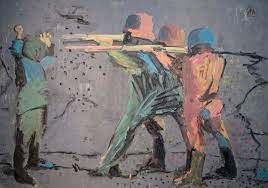
Last week, with almost no debate, the Utah State Senate adopted a bill, 18 – 10, that will allow the use of the firing squad, if drugs were to be unavailable 30 days before scheduled execution. Utah used the firing squad in 2010 to execute one person. Wyoming is examining a similar legislation. The 32 states that still have the death penalty are now looking at this method of the past to continue executing people currently on death row.
In the spirit of innovation, the lethal injection was introduced to remedy the question of suffering in the application of the death penalty, ignoring all kinds of emotional suffering. With the Eighth Amendment prohibition against cruel and unusual punishment, lethal injection was developed after the veterinarian techniques of euthanasia and was first experimented in Texas in 1984. This method carried the promise of modernity with the help of medical-technology imagery, making the death penalty appear different than in China, Iran or Saudi Arabia, some of the other major countries using the death penalty.
In the United States the delusional belief that there is a method of killing that could be “humane” with no suffering is reinforced by the populist imperialist discourse. Supporters of lethal injection pretended that it was humane because of the anesthetic that is injected first. This reflects a limited view on what suffering means. Nonetheless, a study published in The Lancet recognized that the procedure for killing inmates was less rigorous than those recommended by the Veterinary Medical Association. The concentration of anesthesia received by the condemned during the lethal injection was lower than required for surgery in 88% of the cases. In 43% the level was so low that the inmates must have had awareness of the asphyxiation, burning and the massive muscle cramping which are the three episodes that the products used for lethal injection entail. With the blockage of delivery of some of these drugs by European laboratories on humanitarian grounds, States began playing the sorcerer’s apprentice at the expense of respect for human dignity.
In 2014 the number and intensity of botched executions attracted more national and international attention. In Arizona, Joseph Wood was pronounced dead one hour and fifty-seven minutes after the beginning of the process. In Oklahoma, Michael Wilson screamed that his body was burning. As a result many states passed “secrecy laws” to allow themselves not to disclose the nature or sources of the drugs they were going to use.
And now a number of states are considering and passing laws to allow former methods that used to be considered barbaric, from the firing squad and the gas chamber to the electric chair. All these methods demonstrate that there is a distance between justice and the death penalty, as the executioner and the penal system are removed from the actual death of the prisoner.
Last spring, the American Academy of Sciences published a study showing that 4.1% of the people on death row are innocent. Consider the recent killing of Troy Davis whose prosecution consisted of incoherence and inconsistency. Nevertheless, the State asserted its dominating power, using the racially vindicating desire of vengeance of the family of the victim as Troy Davis was African American and the victim was white. As with Kelly Gissendaner whose execution is still pending, Davis’ sentence demonstrated that the state is not concerned with a true notion of justice or rehabilitation but rather is the diehard instrument of populist domination within an increasingly inegalitarian society.
Some states have freed themselves from the death penalty. The death penalty should simply be outlawed at the federal level, instead of leaving populist assemblies free to chose more heinous instruments of death. As Cesare Beccharia wrote in Of Crimes and Punishments in 1764, “If I prove that this sentence is neither useful nor necessary, I would have caused the triumph of humanity”.
(Image Credit: The Atlantic / ycaradec / Flickr)